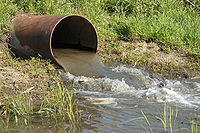Key:outlet
| Description |
|---|
| Describes the nature of a closed duct (like a culvert, a tunnel or pipeline) outlet significantly releasing a fluid without further continuation. |
| Group: man made |
| Used on these elements |
| Documented values: 6 |
| Useful combination |
| Status: approved |
| Tools for this tag |
|
Outlets refer to points where a fluid exits a pipe or a machine. It is suitable on OSM regarding tunnel=culvert, tunnel=flooded or man_made=pipeline whatever substance is flowing inside. Use inlet=* for places where fluids enters a pipe or a machine.
Outlets are key features in fluids, particularly water, management infrastructure and have influence on how culverts or pipeline are operated.
They can be found in many places and can mark a limit between natural and artificial waterways.
Mapping them is useful to know how solid matters (including waste) could be retained in ditches, rivers, storm drains or where water is given back to natural waterways. It's currently possible to look for artificial outlets with topological limits between different linear features. Mappers can find screens, strainers or other solid retaining features there without available tagging to map them.
This documentation only focuses on liquids. It would be possible to extend it to gases if required.
No substance on outlets
outlet=* is intended to cover the entire spectrum and variety of fluids (i.e. water, oil, gases and liquids, etc.) going through this interface/boundary. OSM mappers are invited to only tag the outlet according to their properties.
Tagging of the properties of the fluid coming out of the outlet is should be associated with the pipe or tunnel network (a simple way is implied here) the outlet is a member of. As a consequence, it is not recommended nor desired to reproduce values of substance=* or usage=* related to pipe on the outlet's node. Such data could easily be reproduced on pre-processing.
However, as there are situations where an outlet can be the only visible part of a larger underground infrastructure network that we are unable to map in OSM for various reasons, it would be possible to add substance=* on the outlet when mapped on a stand-alone node without any connecting members of a tunnel or a pipeline way feature.
Outfalls
OSM already documents outfalls with man_made=outfall, referring to places where sewage, rivers, or other watercourses discharge into other watercourses or bodies of water like lakes, seas or oceans. Water can come from a pipeline, a drain, an open-air canal, or other duct.
Sometimes, an outlet may be a distance from an outfall.
Faucets aren't outlets
Pluggable faucets (i.e. drinking fountains activated by a foot pedal) are not actual outlets. This proposal states an outlet should be a significant and a permanent exit (intermittently flowing or not) to an open air environment. As modern faucets may be intended to plug some flexible and mobile pipe, it's not recommended to consider them as outlets.
Decorative fountains may prevent to plug any pipe on them and could be considered as outlet as water hasn't any other option to fall in a basin or continues flowing elsewhere. Most of them should refer to outlet=direct which is the default value.
Tagging
Put a node at the junction between a culvert, pipeline and their open air downstream fluid way and use outlet=* to describe how this outlet is shaped.
| Tag | Value | Description | Presence |
|---|---|---|---|
| outlet | Values below | It's an outlet; see possible values below. | Mandatory |
| flow_rate | Nominal flow rate for which the outlet is designed. | Optional | |
| substance | Substance flowing through the outlet. | Only where the parent pipe or duct is not mapped. | |
| width | Width of the outlet, if applicable. | Optional | |
| height | Height of the outlet, if applicable. | Optional | |
| diameter | Diameter of the outlet, if applicable. | Optional | |
| actuator | Mechanical means to actuate the outlet. | Optional | |
| handle | Manual means to actuate the outlet. | Optional |
